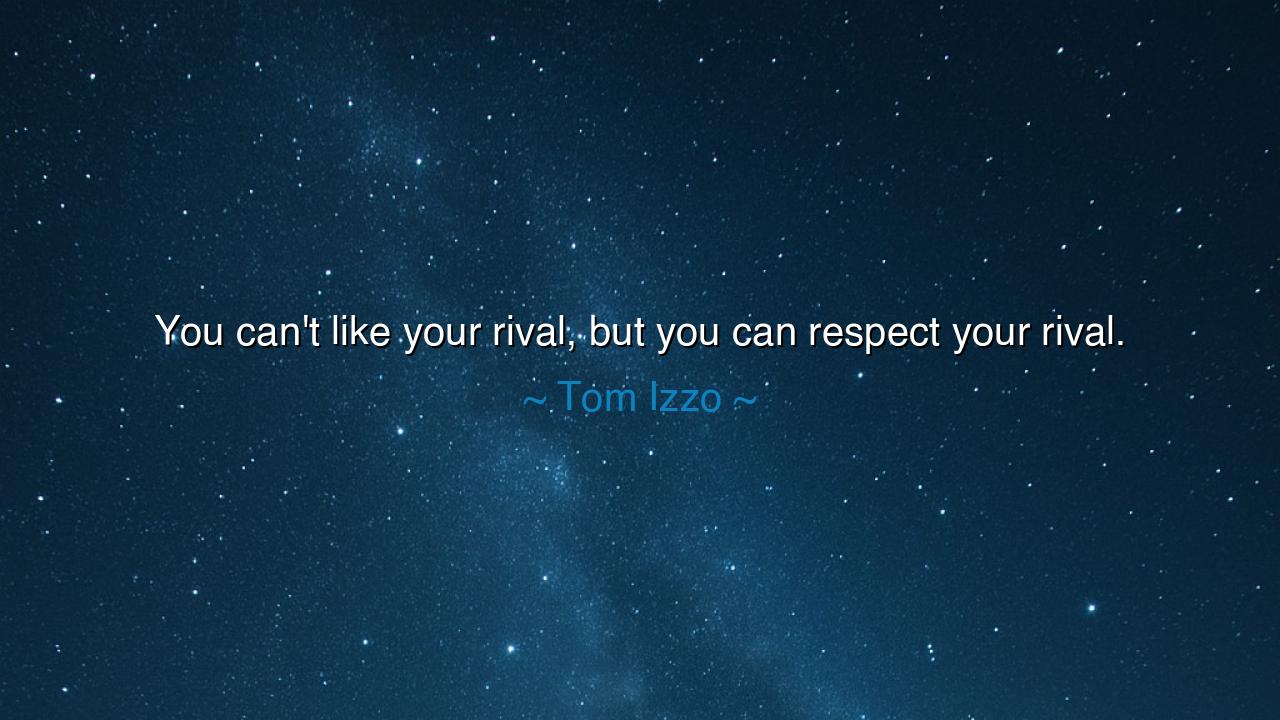
You can't like your rival, but you can respect your rival.






"You can't like your rival, but you can respect your rival." These words from Tom Izzo, a legendary basketball coach, capture a timeless truth about the nature of competition, rivalry, and personal growth. In the heat of battle—whether on the basketball court, in the marketplace, or in the arena of life—rivals are those who challenge us to push past our limits and grow stronger. Izzo speaks to the importance of respect in competition: while it may be impossible to always like the person who stands in our way, it is essential to recognize their value as a worthy adversary. Through this respect, we find the courage to strive for greatness while acknowledging that our rivals are integral to our own success.
In the ancient world, the concept of the rival was central to the understanding of excellence and achievement. Homer’s Iliad tells the story of the great warrior Achilles, whose rivalry with Hector pushes both men to the heights of valor and honor. Their conflict, though tragic, is driven by respect for each other’s strength and abilities. Achilles, despite his anger and pride, recognizes Hector as a worthy foe—someone whose strength forces him to be his best. In this ancient tale, the rivalry does not diminish their respect for each other’s abilities; it deepens it. The pursuit of honor, and the recognition of one’s rival as equally worthy, is what drives them to greatness.
This idea is reflected in the practice of Greek athletics, where the Olympics were founded not just as a celebration of individual talent, but as a test of strength and respect among rivals. The ancient Greeks believed that the agon, or contest, was the most honorable way to prove one’s worth, and it was through the recognition of one’s rival as an equal that true victory could be achieved. A champion was not one who simply defeated their opponent, but one who earned the respect of their rival through the sheer force of their skill and determination. In this way, the ancient world understood that competition and respect were inseparable, a lesson that Izzo continues to teach today.
When we turn to the modern world, we see how rivalry can shape not just athletics but all areas of human endeavor. Take, for example, the rivalry between Roger Federer and Rafael Nadal, two of tennis’s greatest players. Their battles on the court are legendary, each one pushing the other to greater heights. Though they are fierce competitors, each has expressed deep respect for the other’s skill and work ethic. Their rivalry has not been about animosity, but about pushing each other to be their best. Federer has said that his rivalry with Nadal is one of the factors that has driven his own success, showing that true competition can elevate both sides.
The lesson in Izzo’s words is clear: respect for one’s rival is an essential part of growth and excellence. It is easy to dismiss someone who stands in our way, to view them simply as an obstacle to be overcome. However, it is far more powerful to view them as a challenger, someone whose strength forces us to improve, to dig deeper into our own reserves of skill and determination. The rival is not someone to be hated, but someone to be honored, for it is through this mutual respect that both parties are able to achieve their highest potential.
In our own lives, we may encounter rivals in many forms—at work, in relationships, or in the pursuit of personal goals. Rather than viewing them as enemies, we should recognize them as those who push us to become better versions of ourselves. Just as Izzo teaches that the best competitors recognize the value in their rivals, so too should we embrace respect in our own challenges. Whether we are competing for a promotion, striving to improve ourselves, or simply navigating the complexities of life, we can learn from Izzo’s words and view our rivals not as threats, but as opportunities to grow and excel.
The journey of life is full of rivals—but it is not through their defeat that we find our greatness, but through our ability to respect them, to learn from them, and to use their challenges as fuel for our own development. Let us approach our rivals with the same respect and honor that the great athletes and thinkers of the past did, recognizing that true victory comes not from winning alone, but from the growth and knowledge that emerges through the process of challenging ourselves and those around us. In doing so, we will find that the path to greatness is not one of competition alone, but of collaboration with the forces that push us to our highest potential.






AAdministratorAdministrator
Welcome, honored guests. Please leave a comment, we will respond soon